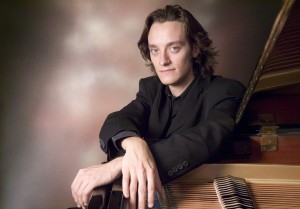Alessandro played an evening recital for us in 2014, and tells us here that RVIPW “has an international reputation and relevance”
How did it feel, to be asked to play at RVIPW?
Any experience or visit to a festival which is especially focused on piano would always be artistically rewarding, first of all for the virtuous connections and comparisons that are established among the artists in terms of programs, experiences and nationalities… and also because it’s always “healthy” for a pianist to know that in front of the stage on which you will play there’s a strong expectation from the audience, who are more and more deeply acquainted and enthusiastically involved in the pieces they are listening to.
How important are festivals like RVIPW to the cultural life of the UK?
Festivals like RVIPW are indeed very important not only in the cultural life of the UK but more generally also in the music world: most of them (and this is the case here) have an international reputation and relevance, they have become the kinds of events that people of this cultural world expect in a very special way: it is like a barometer of the pianistic situation of the moment, and perhaps, a privileged instrument to circulate musical ideas and tendencies; in a certain way they contribute to add a brick to the path of the story of interpretation
How do you go about selecting repertoire for a performance like this, and does it take long to prepare for it?
I try not to be too much influenced by the festival or venue where I play while I’m drawing a repertoire, although I must say that in situation like the RVIPW I felt I a major freedom in suggesting choices that somewhere else might seem somewhat exotic and perhaps a bit farther away from the “mainstream”.
Preparation always depends on the repertoire you choose: the more you include new pieces, the more you need time to consolidate and perfect it; in a 2-month window, I always try to keep at least two or three different repertoires in my fingers for a solo piano recital; hence, at the time of the definitive choice – which normally happens about one year before the event – you have to carefully consider this aspect and go for the most convincing proposal.
How does playing in an intimate venue like Westholme’s Croston Theatre compare with bigger auditorium, and do you enjoy meeting audience members?
As many pianists say, I also think that an intimate venue gives you the opportunity to enter into a more direct relationship with the public (this is true at least from a physical point of view); people can feel your breath, watch your face… almost as if they could guess your thoughts and feelings and be part of the creative moment of music making. Another chance which a smaller hall gives you is the possibility to talk with people and chatting with them to share opinions and thoughts at the end of your performance.
I believe that the relationship you establish with the audience (prior, during and after the recital) is nowadays very important. Society has changed over time, and even the way the music is received, so an artist should show also his most friendly and informal side. Of course this aspect cannot replace that sort of secret correspondence that is created while you’re playing, as a game of giving-having that nourishes the interpretation and the same relationship the interpreter has towards the music. I sometimes say that we must always take music as a serious thing, without taking ourselves too seriously.
What did you enjoy about coming to play for us at RVIPW?
I enjoyed everything about it. I especially appreciated the attention to the details and the consideration for the artists: I’ll always remember when in the afternoon of the concert I was meditating if changing or not the touch weight on the brilliant Yamaha CFX which I could appreciate during my morning rehearsal: I decided to make the phone and call the piano technician Marianne Bailey, trying to explain the situation and what I was looking for. When I came and I sat on the bench for my performance and I put my hands on the keyboard, I relaxed because I immediately realized that my “telephone request” had been received, according to what I precisely wished.
Are festivals like RVIPW important in the development of a young musician’s career?
Absolutely. In particular the choice to present young performers along with more established artists on the same day is intellectually stimulating for both parties. And of course it’s an extraordinary launch ramp for those who are projecting an international career: the RVIPW is in all senses an excellent “business card” and give to the young generations a great credential for any other piano festival.
Do you have a favourite memory of your concert for us?
I remember the moment of my arrival, when I was quite surprised to meet the artistic director, Martin Roscoe, while, after having attended the concert of the evening before mine, at the end he was among the people, lovingly talking with people and he came to welcome me. It was the kindest and most warm way to be welcomed I could expect.
Tell us what you have coming up in the near future?
April will end with a journey to Czech Republic (precisely in Ostrava) where I’ll perform Beethoven 3rd Piano Concerto with the Janáček Philharmonic Orchestra. Then I’ll be back to the UK for the final concert of the Sunday Series of the Harrogate International Series. And immediately after, in May, there will be the release of my latest album, dedicated to Debussy and Ravel (editor: Somm Recordings).



